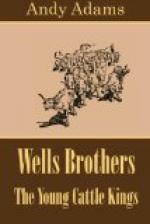The two men rode out of the valley, when they caught sight of a dust cloud, indicating the locality of the trailing herd, then hidden behind the last divide before reaching Beaver Creek. On every hand the undulating plain rolled away to low horizons, and the men rode forward at a leisurely pace.
“I’ve been thinking of those boys,” suddenly said the trail foreman, arousing himself from a reverie. “They’re to be pitied. This government ought to be indicted for running a gambling game, robbing children, orphan children of a soldier, at that. There’s a fair sample of the skin game the government’s running—bets you one hundred and sixty acres against fourteen dollars you can’t hold down a homestead for five years. And big as the odds look, in nine cases out of ten, in this country, the government wins. It ought to be convicted on general principles. Men are not to be pitied, but it’s a crime against women and children.”
“Oh, you cowmen always rail at the settler,” retorted the stranger; “you would kick if you were being hung. There’s good in everything. A few years of youthful poverty, once they reach manhood, isn’t going to hurt those boys. The school of experience has its advantages.”
“If it’s convenient, let’s keep an eye on those boys the next few years,” said the trail boss, catching sight of his remuda. “Now, there’s the wagon. Suppose you ride down to the Beaver and select a good camp, well above the trail crossing, and I’ll meet the commissary and herd. We’ll have to lay over this afternoon, which will admit of watering the herd twice to-day. Try and find some shade.”
The men separated, riding away on different angles. The foreman hailed his wagon, found the victim resting comfortably, and reported securing a haven for the wounded man. Instructing his cook to watch for a signal, at the hands of the stranger, indicating a camp on the creek, he turned and awaited the arrival of the lead cattle of the trailing column. Issuing orders to cover the situation, he called off half the men, first veering the herd to the nearest water, and rode to overtake his wagon and saddle horses.
Beaver Creek was barely running water, with an occasional long pool. A hedge of willows was interwoven, Indian fashion, from which a tarpaulin was stretched to the wagon bows, forming a sheltered canopy. Amid a fire of questions, the wounded man was lifted from the wagon.
“Are you sure there isn’t a woman at this nester’s shack,” said he appealingly to the bearers of the blanket stretcher. “If there is, I ain’t going. Paul, stand squarely in front of me, where I can see your eyes. After what I’ve been handed lately, it makes me peevish. I want to feel the walnut juice in your hand clasp. Now, tell it all over once more.”
The stranger was artfully excused, to select a beef, after which the foreman sat down beside his man, giving him all the details and making valuable suggestions. He urged courteous treatment of their guest while he remained; that there was nothing to be gained, after the accident, by insult to a visitor, and concluded by praising the boys and bespeaking their protection.




